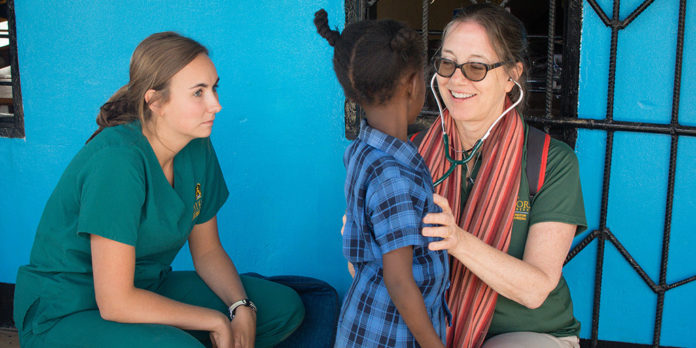
By Taylor Wolf | Social Media Editor
Baylor Missions is partnering with Alpha Epsilon Delta Pre-Health Organization to host two back-to-back sessions of medical missions training on Thursday, aimed at students currently signed up for Baylor Missions global health-focused teams and students interested in future service.
The workshop, entitled “First, Do No Harm: Serving others well on medical missions,” will consist of two sessions at 5:30 and 6:30 p.m. Thursday in the Baylor Science Building, D109. Dr. Lori Spies, assistant professor, Fulbright Scholar and missions coordinator at Louise Herrington School of Nursing, will be speaking about medical missions and the ethics behind serving as a pre-med or pre-health student.
“There is some shady stuff that can happen on medical missions,” Holly Tate, assistant director for global missions-student engagement said. “And we make sure that our students are not participating in anything that could be harmful to a community member or to their own professional development.”
Tate said the workshop will have an emphasis on helping students know that there is a role for them on medical missions even though there may be ethical boundaries as far as practicing medicine abroad.
“If [students] can’t do it here in the States, why should [students] be allowed to do it on someone from a country in poverty?” Tate said. “We’re trying to help students understand and not be discouraged, but at the same time, know they’re not the savior.”
Spies said that as Christians, students need to include Christ in their decisions in the medical field.
“To honor our Lord and Savior, we need to do our most honest work with [communities],” Spies said. “And as future health care providers, [students] don’t want to start [their] career with hap-hazard work or crossing ethical boundaries.”
Spies, who will be conducting the training, said there are things that students can do on medical missions that may seem simple but actually make a huge difference in the success of a mission, such as sharing basic health education with communities abroad or performing health assessments to prep patients to be treated by certified physicians there.
“There are things students can do to contribute to the overall holistic experience at a missions clinic. Things we take for granted here that really can make an impact there,” Spies said.
Spies said she wants students to learn that doing nutrition assessments, playing with children awaiting treatment or even creating a fun educational activity on the importance of teeth-brushing can make all the difference.
Spies’ hope is for students to leave the workshop with a toolbox of creative ways to educate communities abroad, and the knowledge that even though they shouldn’t be stitching up or treating patients, their role is important.
“I want students to be fully participating and contributing meaningfully to holistic health in these communities,” Spies said.
According to Baylor Missions, the topics to be discussed will include the pitfalls and areas of concern in medical missions, supporting local leadership and being culturally sensitive, positive examples from past Baylor missions, how to integrate public and community health lessons into a clinical setting and practical tips for traveling volunteers.
There are two sessions of training because of the growing numbers of students signed up for missions through Baylor. For those interested in future missions and trainings, as well as, practical travel tips and information, head to Baylor Missions website.





